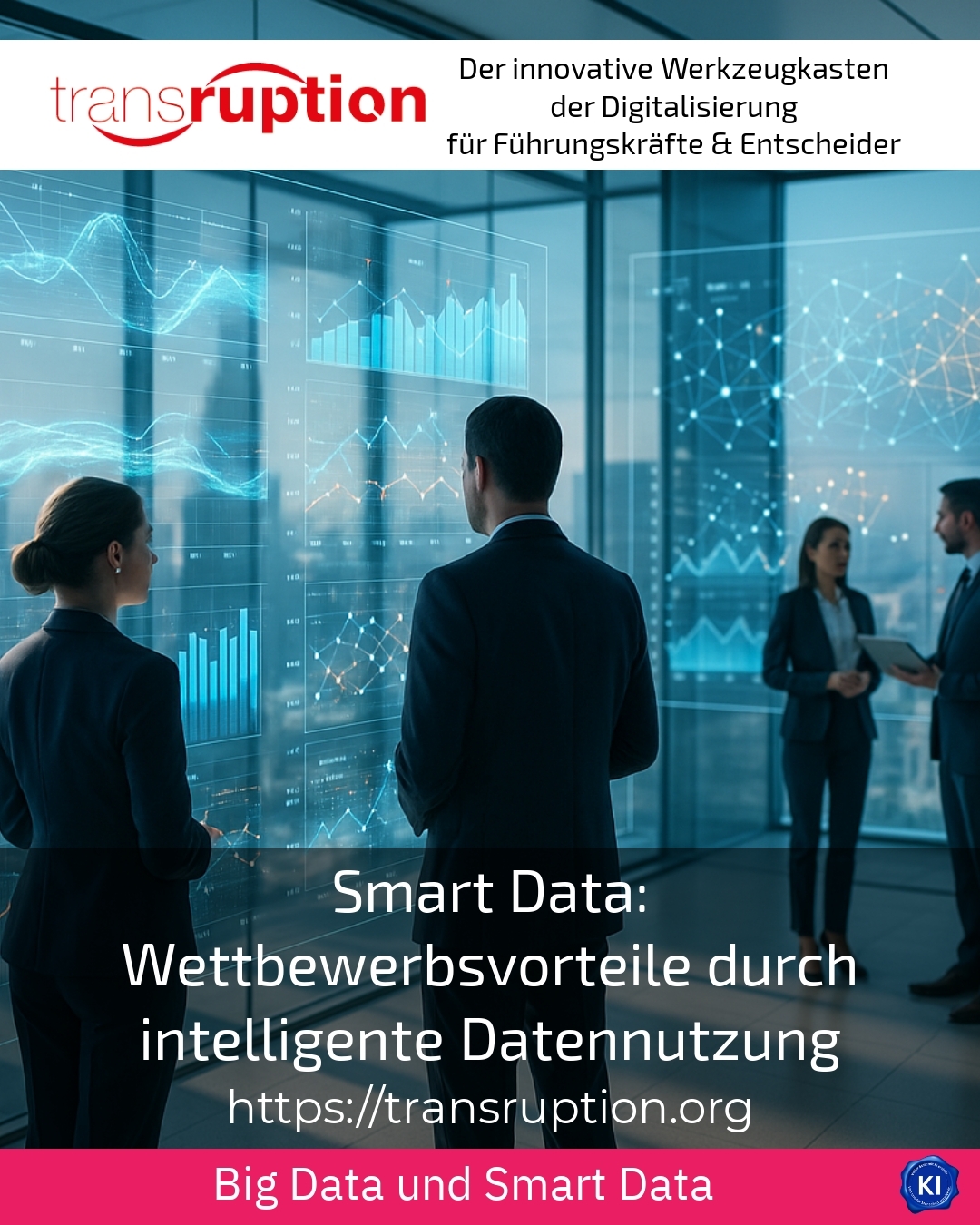The targeted use of smart data opens up a wide range of opportunities for companies to realise competitive advantages through the intelligent use of data. Smart data stands for carefully filtered, high-quality and contextually relevant information that is used in a targeted manner to make decisions more informed and processes more effective. Smart data therefore differs significantly from pure data volumes, as it is important to have and utilise the right information at the right time.
Smart data as the key to strategic decisions
In a world in which companies are surrounded by a flood of different data sources, smart data methods help to reduce complexity. For example, a manufacturing company can use smart sensor data to plan its machine maintenance in advance and thus minimise unplanned downtime. Similarly, energy suppliers analyse consumption data, not only to control power grids efficiently, but also to optimally integrate the proportion of renewable energy.
Another practical example can be found in the retail sector: retailers use smart data to analyse customer data in relation to regional characteristics and derive targeted marketing campaigns. This improves customer loyalty and leads to a higher conversion rate despite reduced wastage.
Insurers are also using smart data in the service sector to assess risk profiles more accurately and develop customised offers. Telecommunications companies can analyse real-time data from users in order to adjust capacities in good time and avoid network bottlenecks. The application of intelligent data management is therefore helping numerous sectors to make decisions and optimise processes.
Practical examples of smart data from different industries
Companies in the healthcare sector are intelligently integrating patient data in order to develop personalised therapy concepts and thus improve treatment success. Universities are using smart data to optimise the management of their campus infrastructure, for example by analysing energy consumption and security data. The insights gained from this help to organise resources more efficiently.
Smart data is used in B2B sales to precisely analyse customer and market needs. Sales departments can use smart analyses to create customer profiles and thus target growth segments more effectively. This not only increases the effectiveness of marketing campaigns, but also the ability to adapt to dynamic market requirements.
BEST PRACTICE at the customer (name hidden due to NDA contract) and then the example with at least 50 words.
For example, transruptions-Coaching supported an industrial client in introducing a smart data strategy to optimise machine running times and manage maintenance work more efficiently. Targeted data analyses made it possible to reduce downtimes and increase production capacity in the long term. The support helped to overcome technical and organisational challenges.
Using smart data to improve processes and strengthen customer relationships
Smart data enables companies not only to streamline their processes, but also to customise them to individual customer needs. In practice, many companies report that they have been able to significantly improve their customer service thanks to smart data analyses. Not only can customer enquiries be processed more efficiently, but offers can also be tailored more precisely.
An insurer uses smart data to better identify risks and can therefore offer individualised policies. At the same time, this increases customer satisfaction because customers feel better understood. A telecommunications provider uses real-time data to combine network performance and customer feedback. This enables them to optimise offers and expand capacities in a targeted manner.
Smart data applications are also useful in the area of building management: intelligent sensors measure energy consumption and environmental data, enabling building managers to control operations ecologically and economically. Investments are thus utilised in a targeted and sustainable manner.
Tips for implementing intelligent data utilisation
Companies should focus on data quality first. Only properly prepared and verified data provides insights that offer a reliable basis for decision-making. It is equally important to involve specialist departments in the interpretation of data in order to draw practical conclusions.
The integration of modern technologies such as artificial intelligence (AI) and machine learning supports automatic analyses and pattern recognition. This makes it possible to identify trends at an early stage and react to them more quickly. Accompanying consulting, such as transruption coaching, supports companies in change management and helps to create internal acceptance for new data-driven processes.
It is also advisable to carry out pilot projects in individual departments. In this way, the benefits of smart data can be demonstrated with manageable effort. Success stories serve as a basis for scaling the methods company-wide and realising further potential.
My analysis
Smart data is more than just a trend - it is an essential resource for companies to remain competitive in complex markets. By utilising data intelligently, companies can work more efficiently, better understand customer needs and make quick, well-founded decisions. The broad applicability of smart data in areas such as production, energy, trade and services shows how versatile this approach is in helping to promote growth and sustainability. Companies that embark on this path strategically and with professional support create sustainable competitive advantages.
Further links from the text above:
Smart data: competitive advantages through intelligent ...
What is smart data? Definition, application and advantages
For more information and if you have any questions, please contact Contact us or read more blog posts on the topic TRANSRUPTION here.















